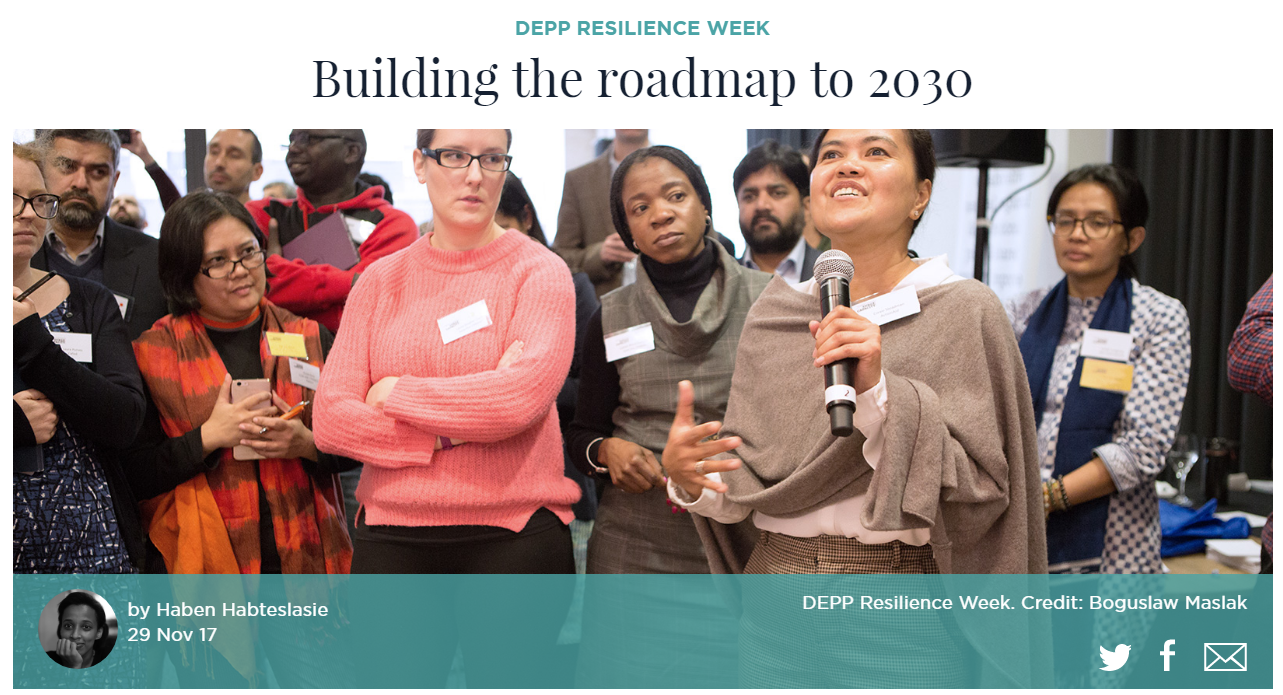CHS Alliance at the DEPP Humanitarian Resilience Week
At the end of November, the wider humanitarian sector including local organisation, INGOs, UN agencies, academia, and private actors came together to discuss learning, best practices and challenges from the Disasters and Emergencies Preparedness Programme (DEPP). The CHS Alliance, as a partner organisation of DEPP, was present during the first three days, and contributed with insights, tools and resources.
#VIDEO: A quick overview on #DEPP, the Disasters Emergencies Preparedness Programme | @DEPPLearning | #ResilienceWeekhttps://t.co/LMohcfSqiS
— Start Network (@StartNetwork) November 20, 2017
At the end of November, the wider humanitarian sector including local organisations, INGOs, UN agencies, academia, and private actors came together to discuss learning, best practices and challenges from the Disasters and Emergencies Preparedness Programme (DEPP). Their aim was to improve the efficiency and quality of resilient humanitarian response in line with the Grand Bargain and the commitments of the Core Humanitarian Standard. The week provided a unique opportunity for participants to discuss the ’future’ of humanitarian surge, capacity building, resilience and localisation. The CHS Alliance, as a partner organisation of DEPP, was present during the first three days and contributed in the following ways:
The Future of Humanitarian Surge: The day was organised around the official launch of the surge learning report which was prepared by Lois Austin and Glenn O’Neil, and published by the Alliance. The report gathered data from project agencies and platforms with the aim of highlighting learning emanating from the Transforming Surge Capacity project in order to support the humanitarian sector towards more effective surge practices. The Alliance was represented by ED Judith F. Greenwood as a panellist focusing on the Core Humanitarian Standard being the enabler of efficient surge response. In addition, the Alliance held a stall where guidelines for HR good practice were shared to support HR surge professionals.
|
|
The Future for Individual Humanitarian Capacity Building: The second day concentrated on the Talent Development Programme, which sought to build the capacity of people best placed to respond to humanitarian crises. The programme delivered three learning and development programmes; an entry-level trainee scheme, mid-level training, and leadership training supported by a network of specially-trained locally- or regionally-based coaches led by the Alliance. Ann Start from Start Development briefed the participants about the outcomes of the coaching programme (access the report here), emphasizing that it was seen as an effective learning resource, particularly for experienced staff, and helped most participants perform better in their workplace.
‘Our legacy will be the 1000 plus staff whose skills we developed and who will go on to make an impact’, Carol Hatchett, DEPP’s #talentdevelopment project manager, speaks about the project’s successes, challenges and @DEPPlearning #ResilienceWeek #GrandBargain pic.twitter.com/DwknFeosLA
— Start Network (@StartNetwork) November 21, 2017
The Future of Humanitarian Resilience: The morning plenary of the third day took on the ambitious topic of exploring what the humanitarian sector will look line in 2030, and as a sub-topic, Gemma Prescott, Project Manager working on the Core Humanitarian Competency Framework at the Alliance facilitated a session on professional humanitarian standards. The focus was on the Humanitarian Passport Initiative (HPass) introduced by Petra Pojerová from the Humanitarian Leadership Academy. The initiative, which is scheduled to pilot in 2018, aims to set up a platform that allows humanitarians to establish and document their skills, experience and learning. The discussion was closed by Gemma sharing the revised Core Humanitarian Competency Framework, a tool which lists skills and behaviours that humanitarian workers should acquire to better perform in their jobs.
Hearing about the Humanitarian Passport Initiative (#HPass) from @AcademyHum which seeks to #indentify, #recognise and #certify humanitarian skills learning and experience. Pilot is planned for April-September 2018! @StartNetwork pic.twitter.com/lVKv2YLmg3
— CHS Alliance (@CHS_Alliance) November 22, 2017
Would you like to hear more about the Humanitarian Resilience Week and explore the learnings that were shared? Check out #ResilienceWeek on Twitter, read Start Network’s blog on the week or visit the learning site of the Disasters and Emergencies Preparedness Programme.

